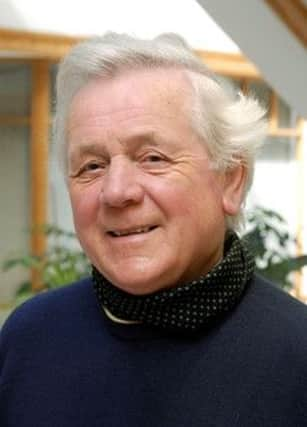All you need is love, but only if it is communicated in Ulster Scots dialect


It was a letter from award-winning author Wilson Burgess, written in his beloved Ulster Scots dialect.
Thereafter Wilson shared an occasional story here that was generally appreciated by more than a few readers who, like Roamer, hadn’t previously given Ulster Scots too much credence.
Advertisement
Hide AdAdvertisement
Hide AdThe remainder of today’s page is another of Wilson’s amusing musings about life, and love, entitled ‘A fine Ulster Scot’s romance.’
In the history of a young Ulster Scot’s life as cloistered and uniform as mine, such a real adventure as publicly falling in love cannot be overlooked.
Her name was Mary Burke and she spoke in a soft Ballweaney Ulster Scots ‘patois’ - a dialect spoken in that particular locality and considered as distinct from a literary language.
My father was most displeased with my choice and insinuated that ‘my still unravished bride of quietness’ - a sarcastic reference to John Keats ‘Ode to a Grecian Urn’ or Harkness McLeister’s ‘At the heels o’ the hunt’, I am not sure which, may have been a descendant of William Burke the infamous Scots grave robber, who in the 1820s, with his friend William Hare, dug up bodies to sell to anatomists for medical dissection.
Advertisement
Hide AdAdvertisement
Hide AdWhen this had no effect on my ardour he resorted to questioning Miss Burke’s mental density and referred to her as ‘a detraquee’, what I now know to be a French word meaning that she enjoyed a good intelligence and active mind but her wits had left the rails and were careering all over the country.
As my mother, who reluctantly accepted the liaison, put it, “One never knows what dear Mary would say next and that she did not know herself added to her charm!”
Rumour had it that Miss Burke’s unusual eccentricity arose from a previous disappointment in love.
I did not think of her as eccentric at all!
I regarded her as sublime and original and I liked her very much.
Advertisement
Hide AdAdvertisement
Hide AdIt would be dishonest if I were to pretend that she did not feel a similar partiality for me.
I leave it to the doyen of Ulster Scots poetry, Harkness McLeister, to put our relationship into perspective:
“Hir approach tae me wiz no the same
Iz the ithers I had met,
She toul mae that she loved me right away
That nae metter whir Ah lukked
Nae better wid Ah get
Sae hurry up an’ name the weddin’ day.”
Miss Burke was the daughter of a retired sheep shearer and lived with numerous siblings in a solitary house high up in Scalty Screedles.
I delighted in my visits to Miss Burke.
She always received me with great effusion, skipping to meet me and leading me by hand held high with a little mincing movement to a rose-covered bower behind the house.
Here she would regale me with a jug of buttermilk and
Advertisement
Hide AdAdvertisement
Hide Adhome-baked scones which were practically inedible, which she described in her alluring Ulster Scots accent as ‘quare packin.’
Conversation with Miss Burke was a great treat to me; I enjoyed its waywardness; it reminded me of a tune that wandered off in different keys, similar, one might say, to her musical talent.
Miss Burke had recently joined the Wild Weemin o’ Ulster Scots Pipe Band and would insist on playing her scales for my edification.
As I listened to her ‘scraichin’ on the bagpipes I thought how churlish it was for Scots poet William Dunbar to suggest that if there was going to be music in hell it would be the bagpipes. I thought I had never heard anything so lovely; it all seemed intoxicating beyond anything I had ever dreamed of.
Advertisement
Hide AdAdvertisement
Hide AdI searched my mind for a romantic line and had to refer to Ulster Scots ‘noble prize winner’ McLeister, but unable to find something to suit the moment, I opted for a little epic by Christopher Marlowe:
“Beautiful Leander, beautiful and young
Whose tragedy divine Musaeus sung.”
I could see myself at that moment as Leander who drowned while trying to cross Hellespont to reach his beloved Hero the priestess of Aphrodite.
Sadly, Miss Burke was not a partner in my joy!
With a pale face and burning eyes she stood over me, the prey of violent perturbation.
It was sometime before she could resolve on the form of a valedictory speech.
Advertisement
Hide AdAdvertisement
Hide AdShe then denounced me in unmeasured terms for bringing into her house lines from some abominable atheistic non-Ulster Scots poet.
“If mae fether widda heerd you quotin’ frae some oul book that wisnae Ulster Scots hae widda set yae doon as a profligate an’ no a fit boady tae merry haes dochter,” she scraiched.
I was greatly wounded and offended, but my indignation was smothered up in the excitement that never again would I err in quoting any Romantic poet other than Crushybracken’s favourite son, and the master of all Ulster Scots poets Harkness McLeister,
My father for his part was pleased that the relationship had ‘founderd’ and could not contain his enthusiasm when telling me that he had it from good authority that in future all Ulster Scots couples contemplating marriage would be eligible for a financial grant from a Government quango set up to discourage them “frae livin ower the brush” - that is, living in an unmarried state.